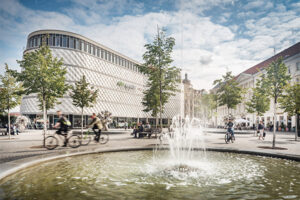By Jitka Kadlčíková

These can include disputes between the shareholders of the development company, controversies between management and shareholders or between the managers themselves, and, most commonly, disagreements with third parties, such as neighbors, before the construction begins and during it (e.g. due to excessive dust or noise).
Then there may of course be disputes with construction companies or with future or current tenants caused by delays or defects in the work. In addition to classic dispute resolution methods, such as court or arbitration, or Anglo-Saxon-style adjudication (which is rare in the Czech Republic), developers may consider using mediation, which in commercial matters has been established officially in the Czech Republic since 2012.
Mediation may be involved in various stages of a shopping mall development and reference thereto may even be included in a classic dispute resolution clause that may be amended by the following (or similar, since Czech law does not have a standardized mediation clause): “all disputes arising from or in connection with this agreement shall be first settled in mediation commencing no later than [deadline to be included] after the dispute has arisen. The parties have agreed that [name to be included] will act as a mediator, the mediation proceedings will be held in [place to be included] for a period of [period to be included] and that the costs of mediation proceedings will be borne equally by the parties.”
In addition, developers may encounter a court-ordered first meeting with a mediator, i.e. an informative meeting with a mediator allowing the parties to discuss the issues and possibly settle out of court.
The advantages of mediation in both its varieties—i.e. voluntary or initiated by court order—are numerous. First, the mediation process gives the parties the opportunity to discuss their differences and to find a solution that best fits their needs with the help of an impartial third party whose aim is to facilitate communication between the parties, help them find a consensus, and focus on their interests and how best to meet them.
When mediation starts, on the other hand, the effects on statutory limitation of claims are the same as with a court dispute, i.e. the statutory limitation period ends. Mediation lowers the risk that the dispute will be resolved to the detriment of either of the parties and that their relationship and future cooperation will be damaged, an advantage that may be important in the relatively small segment of large development firms and their suppliers, clients, or tenants.
Second, mediation is a strictly confidential process. The mediator has a confidentiality obligation and the parties frequently assume such an obligation in the agreement on mediation as well. This should help the parties talk openly without the risk of being exploited and ensures that no third party learns about the contents of the mediation—unless the parties to the dispute so agree.
Third, the mediation process is informal and the parties may, if expedient with respect to the complexity of the dispute, agree on a team of mediators with expertise in different fields. Mediation also may be held in a language other than Czech or outside of the ordinary opening hours of the courts, as well as online via Skype or other means of communication.
In addition, mediation is much less costly and time-consuming. According to publicly available information, the average mediation—not only in shopping mall development—lasts from 7 to 15 hours and costs 67% less than regular court proceedings. Last, the mediator does not impart the solution to the parties’ dispute; the parties find the solution themselves and the contents of the settlement agreement are entirely at their discretion. Naturally, they should consult their lawyers to implement the agreements legally.
Mediation of course also has some disadvantages. A settlement agreement is not an enforcement title per se: The parties cannot enforce it directly, unless the agreement is approved by the court or drafted as a notarial deed with consent on direct enforceability.
The result of a mediation process does not create a precedent or case law, and the information openly shared during mediation may be misused by the other party breaching its confidentiality obligation. Additionally, although mediation has already been established for five years in the Czech Republic, it is not well known and the parties may have doubts about its advantages in their dispute resolution.
Nevertheless, we strongly believe that mediation clauses should find their way into contracts regarding shopping mall development and should not be feared, as mediation may provide a quick, cost-effective, and viable solution that satisfies the interests of all participants.





